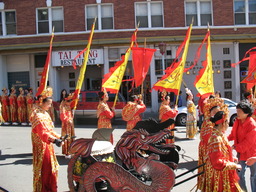
Neighborhood Parade: Seattle
Chinese Girls' Drill Team
 Neighborhood Parade: Seattle Chinese Girls' Drill Team |
They've been saving all the difficult questionnaires for me: addresses around my neighborhood where the occupants speak no English. It's been fun going out and communicating; I've learnt so much about the people who comprise Seattle's Chinatown.
My level of Mandarin may not be high--but it is enough to complete the census interview. The questions are basic, requiring little functional language skill: any backpacker who toured China for a month could probably take on the role. I've been over these exact topics so many times before with some fellow passenger on countless train and bus journeys. "What is your name? How old are you? When is your birthday? May I have your telephone number?" The printed survey I pencil responses into while standing on people's doorsteps could serve as a near-verbatim transcript of the same conversation I've held hundreds of times while on the road.
The census questionnaire does make one departure from what otherwise serves as template for small-talk while traveling throughout China. Question 5 enquires whether the other party is of "Hispanic, Latino, or Spanish" origin. I ultimately decided that asking this is moot when speaking with somebody living in the U.S. who can speak Chinese but not minimal English.
Strictly following formula, I actually did try translating question 5 the first few times I conducted an interview in Chinese. Perhaps my guess of "ladingzu" was too far off from whatever the precise Chinese term for "Hispanic" is. Perhaps the respondents just couldn't parse such an unlikely question. Whichever the case, I was met with bewilderment when sticking to the script.
So, in more recent interviews I've decided to skip asking Chinese-speaking respondents whether they are aware of Spaniard heritage in their family tree. I go straight to question 6: the particulars of ethnicity. (For some reason the race question is separate from the one asking about Hispanic origin.) Rather than read each choice from the printed list--among which are unlikely responses including "Negro" and "Guamanian"--I just infer: "So, you're ethnically Chinese (Han), then?" It doesn't feel an unreasonable assumption that somebody I've been conversing with for several minutes in Mandarin would be:
Indeed, I have yet to find any speakers of Mandarin who claim Latin blood. But, I was surprised to find several people I interviewed in Mandarin who explicitly classified themselves as "not Chinese":
I could tell by the way one man spelled his name that he must be from Vietnam. I had presumed that when the question about ethnicity came up he would make a clear distinction. If he wasn't of Chinese ancestry, how else could he speak Mandarin so well? He certainly didn't speak any English. But, when clarifying which box to check he insisted that he was not at all Chinese but purely Vietnamese. (His interview also yielded a sad answer to another simple question. When asking whether there were any other family members who might occasionally stay the night at his apartment [e.g., babies, relatives, etc.] he trailed off by saying, "Kids? Oh, they never have time to come around... ")
My concept of who identifies themselves as Chinese was further refined in separate interviews I conducted at two units in an old folks' home. Upon getting to the part in the form where I asked my leading question, "So, you're ethnically Chinese, then?", both elderly ladies corrected me with the reply, "I am Taiwanese."
I had presumed that--whatever the political divide--the Taiwanese would also consider themselves Han.
But it was the response that each gave after asserting their ethnicity that surprised me even more. Both women framed it in nearly identical phrasing:
"I am from Taiwan, but my first language is Japanese."
I thought about the history of Taiwan before World War II. What they said made sense. Of course people of their generation would speak at least some Japanese--it just never occured to me that the colonial language might be the dominant one, the one which they still felt more comfortable speaking.
I concluded interviews with both women with what smattering of Japanese I could recollect on-the-spot. "Oh. So, during your childhood you spoke Japanese? Really? Thank you very much. Goodbye."
I was smiling for a long time after completing each of those interviews. Even in a good mood, it somehow felt dissonant to step out from their tall apartment blocks and directly back onto familiar streets I'd walked for decades. All of these interesting people lived within a couple-block radius from my own apartment. How ironic that, before this census operation, I'd never found reason to talk with my neighbors or to set foot inside their buildings.